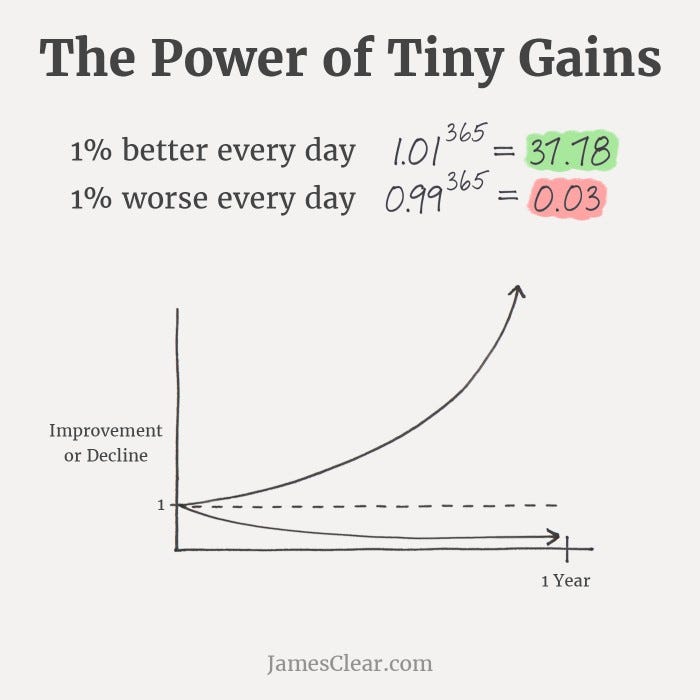You get what you repeat
James’ best advice to the world can be summarised in 4 words (as seen below)
What does it mean? As he states, we convince ourselves that massive success requires massive action. But it’s wrong. On the contrary, our outcomes are a lagging measure of our habits.
What do I mean by that? Again in his words, your net worth is a lagging measurement of your financial habits. Your weight is a lagging measure of your eating habits. Your knowledge is a lagging measure of your learning habits. Your clutter is a lagging measure of your cleaning habits.
You get what you repeat.
What progress is really like
Breakthrough moments are often the result of many previous actions, which build up the potential required to unleash a major change.
Let’s imagine what this means for a minute with an example from the book.
Imagine an ice cube as a room heats up in 1-degree increments.

26…
27…
28…
to 31 and still, nothing has happened.
Then at 32, the ice begins to melt. A 1-degree change, seemingly no different than the previous ones, but this one unlocked a huge change. It started to melt the ice.
Complaining about not achieving success despite working hard is similar to complaining about an ice cube not melting when you heated it from 25 to 31 degrees. Your work was not wasted; it is just being stored. All the action happens at 32 degrees.
Habits are the compound interest of self-improvement. The same way that money multiplies through compound interest, the effects of your habits multiply as you repeat them. So with this in mind, remember, making a choice that is 1% better or 1% worse might seem insignificant at the moment, but over the span of moments that make up a lifetime these choices determine the difference between who you are and who you could be.
If you don’t believe me, see the difference (or would I say the power of tiny gains) within 365 days.

Forget about goals, focus on systems instead
If you are reading this sentence, that means you are still interested in the topic. Great, let’s continue.
So, to be able to 1% better every day, you don’t need goals. You need systems.
Why?
In James’ his own words:
The goal in any sport is to finish with the best score, but it would be ridiculous to spend the whole game staring at the scoreboard. The only way to actually win is to get better each day. In the words of three-time Super Bowl winner Bill Walsh, “The score takes care of itself.”
The same is true for other areas of life. If you want better results, then forget about setting goals. Focus on your system instead. Goals are about the results you want to achieve whereas systems are about the processes that lead to those results.
Goals are not bad obviously. It’s nice to have goals. However, goals are good for setting a direction, but systems are best for making progress.
4 Problems of goal setting
As James says if you spend too much time thinking about your goals and not enough time designing your systems, you would encounter 4 problems.
#1: Winners and losers have the same goals
The goal itself isn’t what differentiates the winners from the losers. Every Olympian wants to win a gold medal. Every candidate wants to get the job. Both successful and unsuccessful people share the same goals.
As humans, we mostly concentrate on the people who end up winning. And we mistakenly assume that ambitious goals led to their success. And we tend to ignore all of the people who had the same objective but didn’t succeed. This is called survivorship bias. And goal-setting suffers from a serious case of survivorship bias.
#2: Achieving a goal is only a momentary change
In James’ his own words:
Achieving a goal only changes your life for the moment. That’s the counterintuitive thing about improvement. We think we need to change our results, but the results are not the problem. What we really need to change are the systems that cause those results. When you solve problems at the results level, you only solve them temporarily. In order to improve for good, you need to solve problems at the systems level. Fix the inputs and the outputs will fix themselves.
#3: Goals restrict your happiness
With a goals-first mentality, we’re continually putting happiness off until the next milestone. Furthermore, goals create an “either-or” conflict: either we achieve our goal and are successful or we fail and we are a disappointment. This is not ideal and healthy. It makes no sense to restrict your satisfaction to one scenario when there are many paths to success. On the contrary, a systems-first mentality enables being successful in many different forms, not just the one you first envision.
#4: Goals are at odds with long-term progress
When all of your hard work is focused on a particular goal, what is left to push you forward after you achieve it? When the race is no longer there, what motivates you? This is why many people find themselves reverting to their old habits after accomplishing a goal.
As James says the purpose of setting goals is to win the game. The purpose of building systems is to continue playing the game. True long-term thinking is goal-less thinking. It’s not about any single accomplishment. It is about the cycle of endless refinement and continuous improvement. Ultimately, it is your commitment to the process that will determine your progress.
Fall in love with systems
Having a system is what matters. Committing to the process is what makes the difference.
I’m helping ambitious people to master how to think better so they can live their life better. If you liked this post, join me and get signals in the noise.
